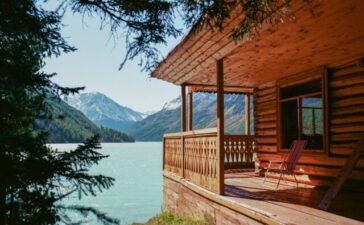Buying a holiday home can be a fantastic investment to enjoy with your family and to provide a great source of income. Holiday home asking prices are very competitive and can have an excellent yield if you have a good letting plan. Whether you like to spend time near the ocean or tucked away in some quiet corner of the idyllic countryside, there are so many great holiday home options.
In this article, we explore the benefits of investing in a holiday home.
For Personal Use
A Fantastic Place to Take a Vacation
Investing in your own holiday home gives you a great place to get away from your busy life and spend quality time with your friends and family. In whichever state you are looking for a holiday home, there are so many fantastic options available. Look out for cool vacation spots that are not too far from where you live and you will get a lot of use out of your holiday home. So if you live in Idaho, it would be better to look for a place where you can go and stay every weekend and take a vacation more often. Victor, Idaho, as stated in https://www.tetonvalleyrealty.com/victor-community/ is fast emerging as a tourist hotspot for vacationers and people who live and work in the big Idaho cities. This is great if you have to live in the city for your job or your children’s schools, but you love to escape to the spring, lake, or the mountain whenever possible. Going on vacation can often be stressful as you don’t know what to take with you and usually end up overpacking or underpacking. When you own your own holiday home, you know exactly what is provided and so there is far less preparation needed.
Save Money
As you already own the holiday home, you won’t have to pay for accommodation when you decide to take a trip. Additionally, you are far more likely to cook when it is your own home that is stocked with food and cooking supplies rather. Hotel rooms do not tend to have kitchens, and even if there are cooking facilities in rented apartments, holidaymakers tend not to use them. Cooking yourself on vacation can save a huge amount of time and money compared to eating out three meals a day.
As a Business Opportunity
Good Source of Income
As a broad rule, take what you would get for a traditional buy-to-let for a month, and that is what you should charge for a week. So it will be roughly 4 times more expensive than a traditional buy-to-let, but remember that you will probably only rent out the property between 30 and 40 weeks a year, depending on how much you intend to stay in the property. After mortgage, cleaning, management fees, repairs, and other fees, you could end up with a yield of around 12-15% of the original price you paid for the home. Depending on where you live, renting out your holiday homes can have some significant tax advantages. In many jurisdictions, holiday homes are considered a business rather than a home and so you may be entitled to certain tax advantages that homeowners and owners of the traditional buy-to-let properties don’t get. Make sure that you do your research on the tax policy in your state and if necessary, seek advice from a tax accountant who specializes in rental properties and holiday homes.
No Arrears
Unlike traditional buy-to-let where your tenant goes in and you hope that they pay their rent, with a holiday home, guests pay in advance so there is no danger that you won’t receive your money. If a potential guest does not pay in advance, then you do not book them into your home. Guests will also pay a small deposit for any wear and tear they cause while staying in your holiday home but they can get this back as long as the property is returned in the same condition as when they received it.
No Evictions
In a traditional buy-to-let home, you may rent to bad tenants who damage your property or cause problems with neighbors, in which case you as the landlord will need to warn your tenants and, if the problems continue, you will need to evict them. When people stay in your holiday home, they are just on vacation for a short time, so they will rarely cause the kinds of problems that can occur in a traditional year-round rented property. If there is any major damage done, then you can charge your guests for it at the end of their stay, but evictions are very rarely necessary as guests will leave when their vacation is over.
Less Wear and Tear
If you are renting a property for just 30 weeks a year to holiday makers rather than permanent tenants then they will spend a lot of time out exploring the local area. They will probably only be in the property for half the time of the vacation so there is a lot less wear and tear than with a traditional rental. There will be increased cleaning costs between guests, but when it comes to replacing things year in year out, the costs will be a lot lower than a traditional buy to let.
Portfolio Diversification
If you have a portfolio of buy-to-let properties, but they are all similar kinds of properties then you are putting all your eggs in one basket. It is always better to diversify your portfolio to ensure that you are spreading the risks and advantages of a range of different properties. A quality holiday home can provide a high yield source of income within a more conservative portfolio of lower yield traditional buy-to-let properties. Properties that are suitable for holiday homes are different from traditional buy-to-lets. There is a specialized set of features that are attractive in a holiday home that just wouldn’t be suitable or necessary in a day to day family home. Because of this, properties that are suitable for holiday homes are not that popular amongst buyers so there will be little competition when you come to make an offer.
Buying a holiday home is a great way to spend quality time with your family and get away from your busy life for a while. When you are not staying in your holiday home, letting it to other guests can provide a fantastic income. With so many options available, do some careful research and you should be able to find the perfect holiday home for you.






